Difference between revisions of "Geared Aerodynamic Pan and Tilt"
(→Slide Covers) |
(→Assembly) |
||
| Line 170: | Line 170: | ||
|} | |} | ||
<br><br> | <br><br> | ||
| + | |||
| + | === Mechanical Parts === | ||
| + | |||
| + | xxx | ||
=== Assembly === | === Assembly === | ||
Revision as of 01:31, 28 February 2018
Contents |
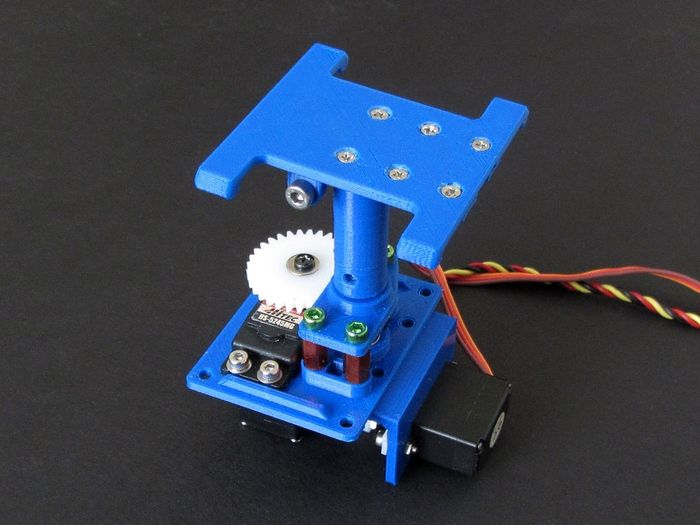
|
| Aerodynamic and Accurate! |
Introduction
Having designed and released a pile of different Pan and Tilt units I decided to try and make some improvements. I came up with a list of simple design goals that were based on requests and experiences with my and other PnT's. The list then, in order of importance is:
- Lighter and Faster than my HD Pan and tilt (100g)
- - New weight is 80g with the selected components
- Is smooth and precise with excellent centering
- - With a new programmable digital Hitec HS-5245MG servo, it is extremely smooth and centers beautifully
- Is more aerodynamic
- - Now with both servos mounted below the deck, it is very aerodynamic
- Can be made from off-the-shelf components
- - All but one component is made from standard off-the-shelf parts (see text)
- Rotates 360° or more
- - Rotation can be programmed from 236° to 398°
- Tilts down 50 degrees or more
- - Tilts down 42° (see text)
NOTE Apologies to all followers in Europe and Australia! The components selected started with a new (awesome) drive gear from ServoCity.com which I know can be very hard to find outside the US. The drive gear comes with the Hitec spline already molded in which made the design and subsequent build much easier. Of course this also means the gear shaft and bearings are also imperial dimensions.
The new unit has a lower profile than the HD unit and needs a smaller through-deck hole:
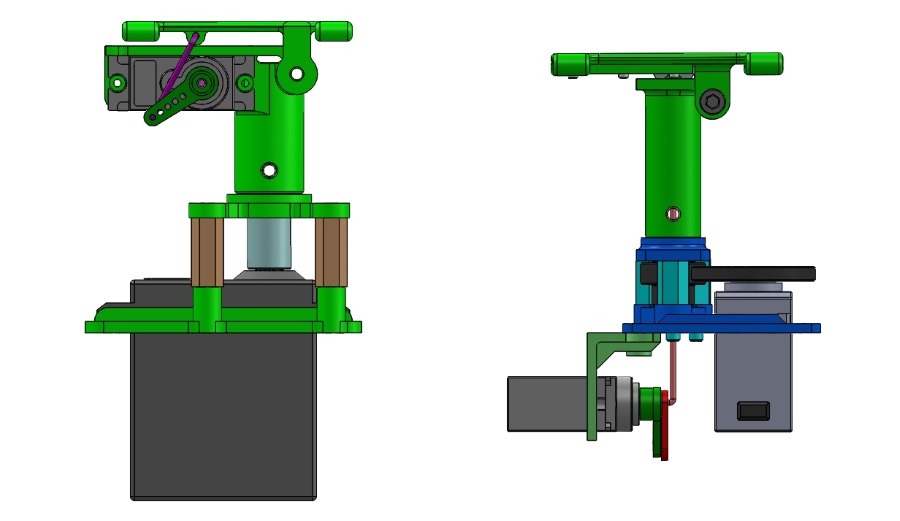
|
| HD and Aerodynamic Pan and Tilts |
Configurations
For this project I decided to keep it simple so there is only one pan-only setup and one tilt setup.
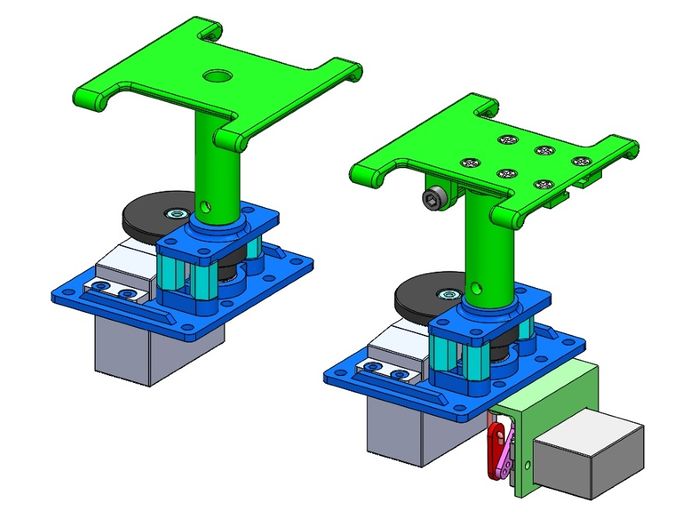
|
| Pan-only and Tilt decks |
Notes on Standard Configuration
- TBA
Parts and Specifications
Print Parts
- Base Plate
- Bearing Support Plate
- Tilt Servo Mount Bracket
- Tilt Turret
- Tilt Deck
- Tilt Deck Slide Covers
- Pan Deck
Off the Shelf Parts
- 2x Dubro #107 1/2A Control Horns (one pair)
- 1x Dubro #109 2-56 Spring Steel Kwik-Link Clevis
- 1x Dubro #172 2-56 Threaded Rod
- 1x Pushrod Linkage Stopper D2.1mm
- 1x ServoCity #RSA32-2HS-26 32 pitch/26 tooth Acetyl Servo Gear - C1 Spline
- 1x ServoCity #SPBD32-34-16 32 pitch/16 tooth Acetyl Plain Bore Gear
- 2x ServoCity #535018 .250"ID x .375"OD x .125"L Non-Flanged Ball Bearing w/Dual Shield
Hardware
- 4x M2.5x6mm Machine screws
- 4x M2.5 Flat Washers
- 8x M3 x 6mm Machine Screws
- 3x M3 x 10mm Aluminum Stand-off
- 1x M3 x 30mm Machine Screw
- 1x M3 Nylok Nut
- 2x M2 x 8mm Machine Screw
- 2X M2 Hex Nut
- 2x M2 x 4mm Machine Screw
- 6x M2 x 5mm Flat Head Machine Screw
- 1x M2 Flat Washer
Servos
- Pan - Hitec HS-5245MG digital programmable Mini Servo (27g)
- Tilt - Corona DS929MG digital micro servo
- NOTE: This project was designed specifically around the two servos shown
Mechanical Specifications
- Total weight with all hardware shown - 89 grams
- Pan rotaion - 236 - 398 degrees
- Tilt range - 0-42 degrees (down)
The Build
On any project such as this, understanding the work scope and finding the resources needed is a key to success. For the full tilt version there are 6 3D print parts that require some detail work and one aluminum gear shaft that will require some machining.
3D Parts
It is important here to makes sure your printer is calibrated for the filament you have selected as there is a critical dimension to interface the two gears. If you don't know whether your printer is calibrated, create or download a 20mm test cube, print it, and measure the results. If the test cube is within 0.25% (19.95mm to 20.05mm))or better of 20mm, then you are OK. If not, go through the calibration process on your printer or scale the print to fit.
Base Plate
The base plate and bearing support plate are designed so the ball bearing just pushes in. If the bearing is to tight, a dremmel sanding tube can be used to open it up. If the bearing hole is too loose, small strips of cellophane tape can be used to tighten it up.
The base plate needs the 4 servo mount holes tapped to M2.5 and the 3 bearing support holes tapped to M3. An alternative to the M2.5 is to use four M2 x 8mm machine screws and large flat washers.
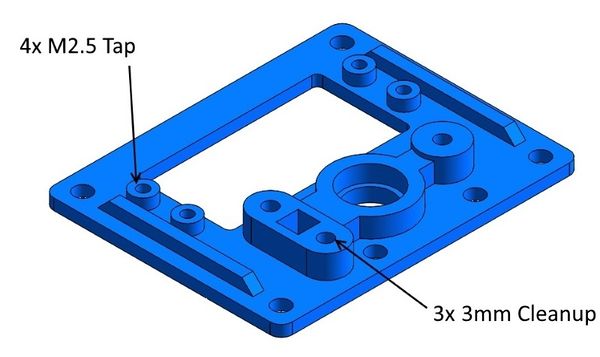
|
Bearing Support Plate
The support plate needs the three 3mm holes cleaned up with a 3mm drill bit and the bearing bore checked for fit.
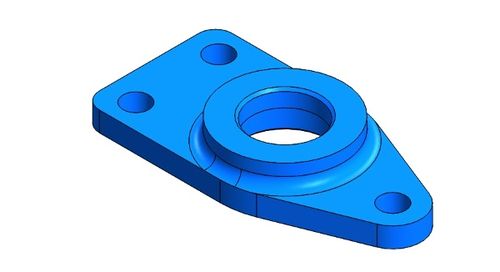
|
Turret Base
The Turret needs 4 holes cleaned up to 3mm and the bottom interface hole cleaned up to .250" (6.35mm)
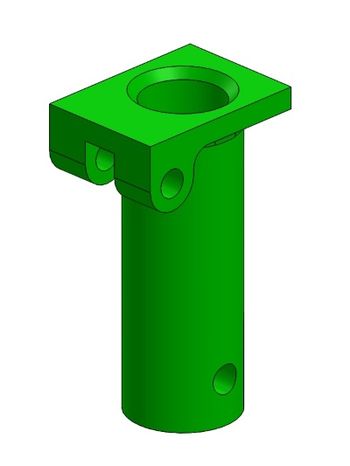
|
Tilt Plate
The Tilt plate needs 6 holes cleaned up for the M2 x 5mm flat head screws and the pivot holes cleaned up to 3mm.
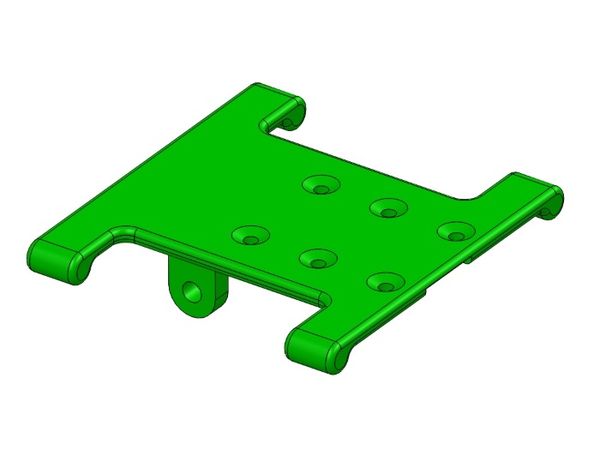
|
Slide Covers
The slide covers need their 3 holes tapped to M2. Alternatively you could glue these plates on.
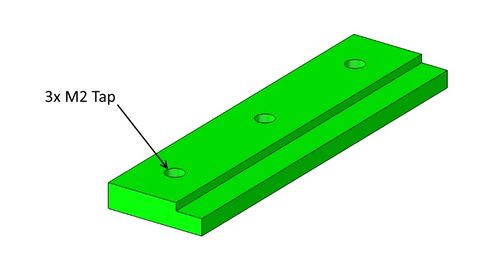
|
Mechanical Parts
xxx
Assembly
On the Camera Mount pivot use the two Nylon M3 screws cut down so that they tighten against each other without jamming the pivot points.
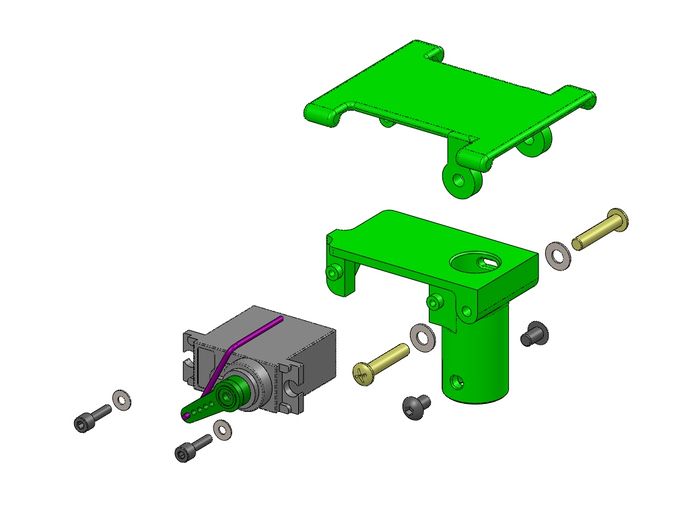
|
| Upper unit assembly |
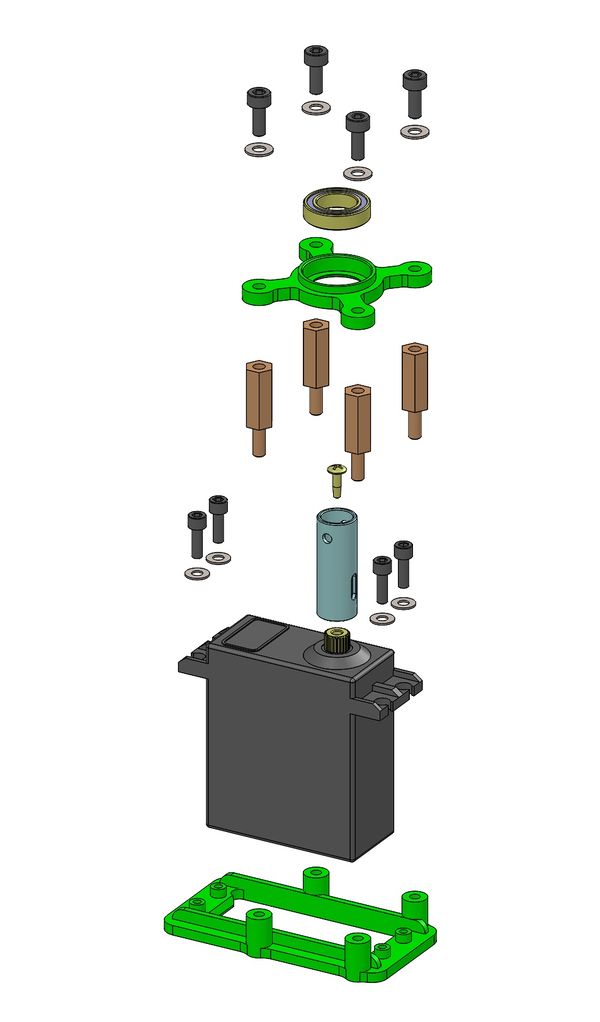
|
| Lower unit assembly |
A Video Sample
|
Test at Eldorado Dry Lake - October 2016 |
See Also
Project 3D Print Files
The following are the 3D print ZIP files used in this specific build. For more versions and information, please see my Thingiverse postings here:
Mark_q Thingiverse Designs
Where to buy the parts
- For the bearing and servo coupler -
- For the GWS S125-1t 25t servo -
- Global - GWS S125-1t Servo
Comments? Questions?